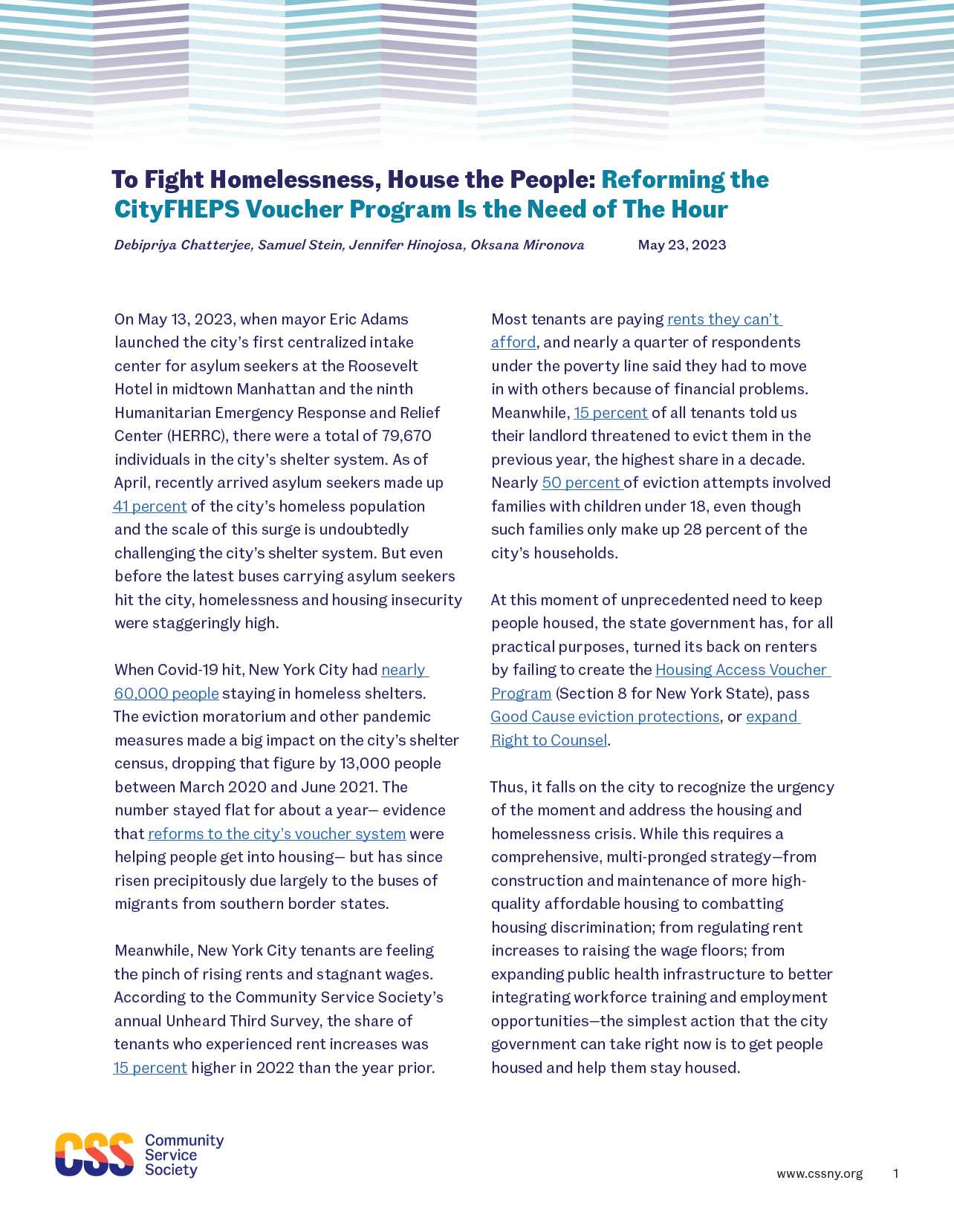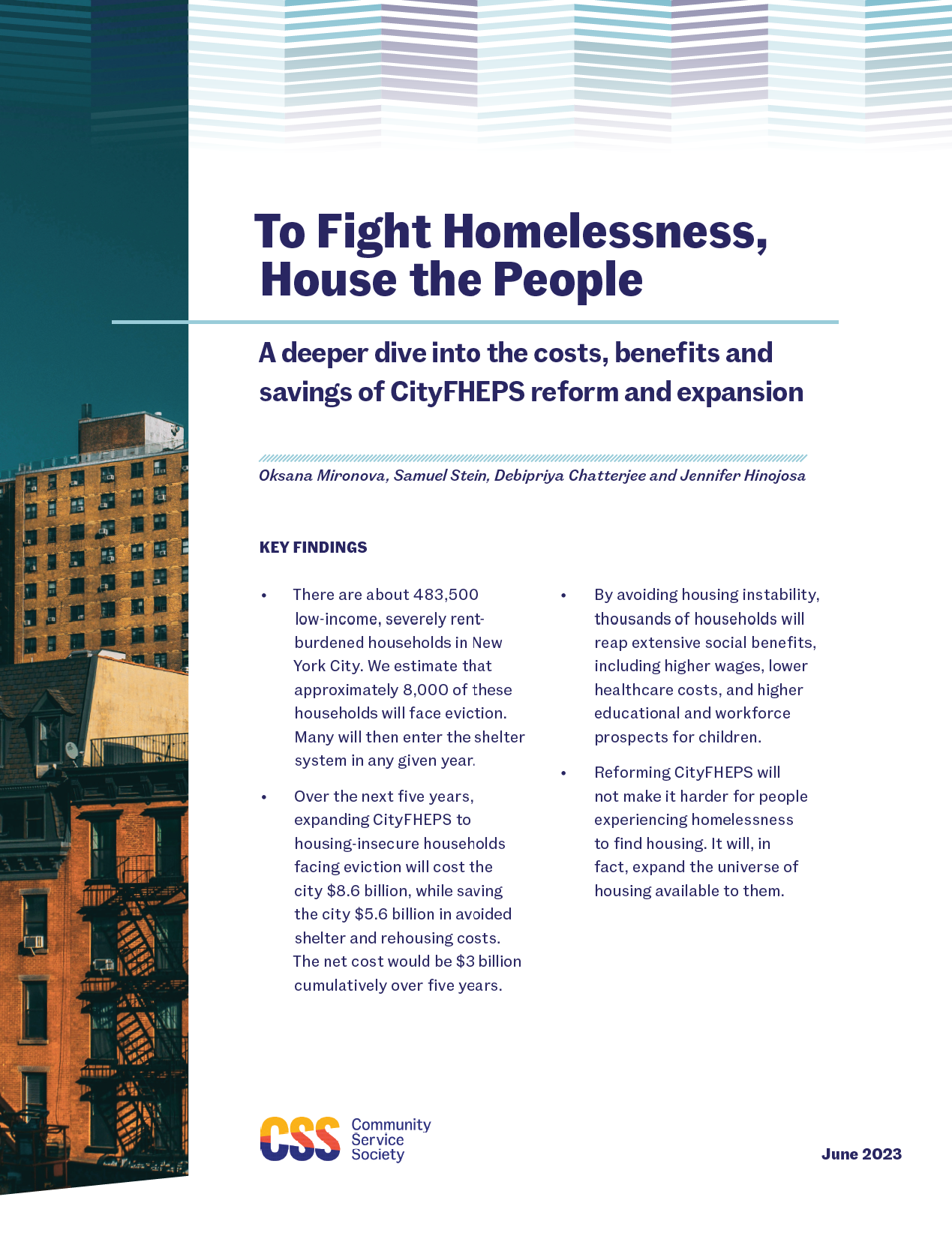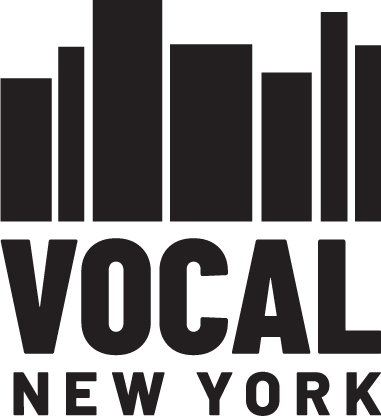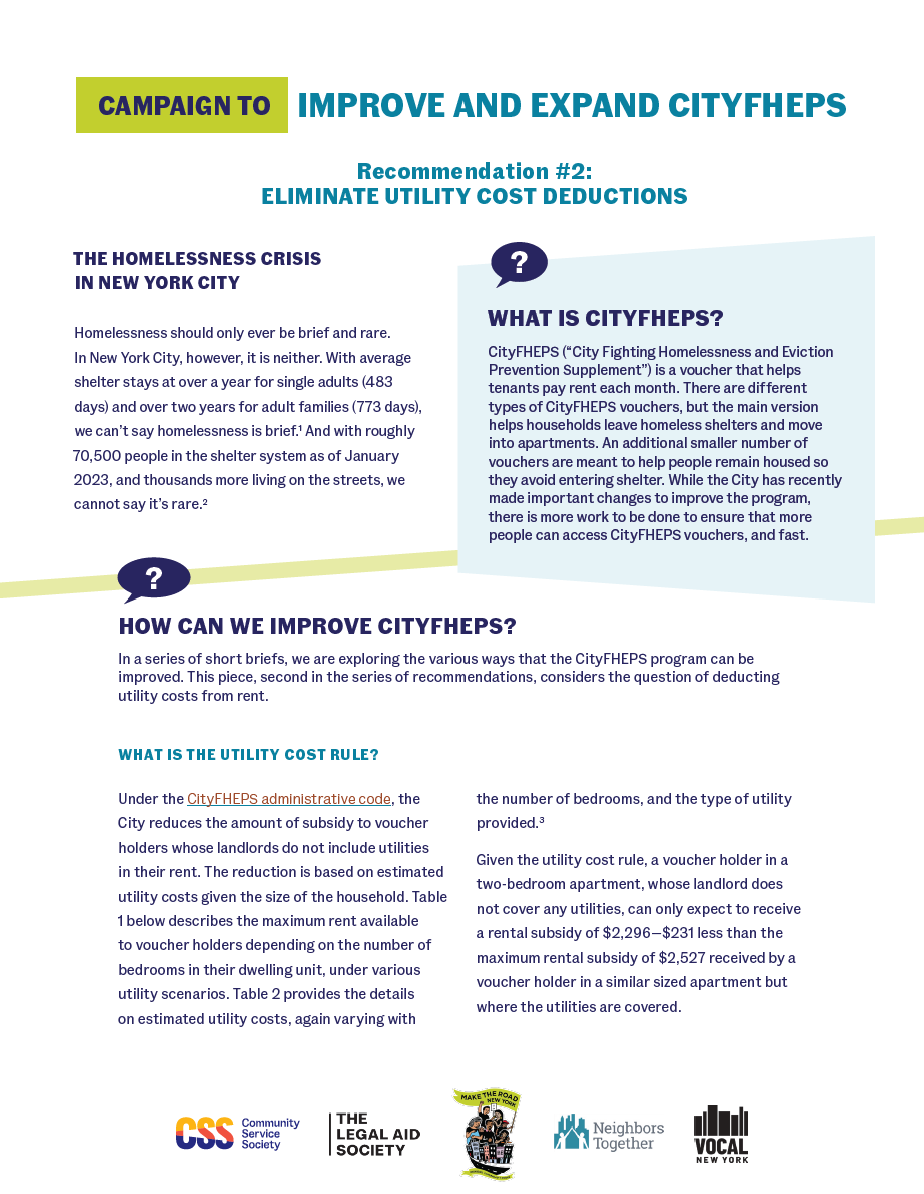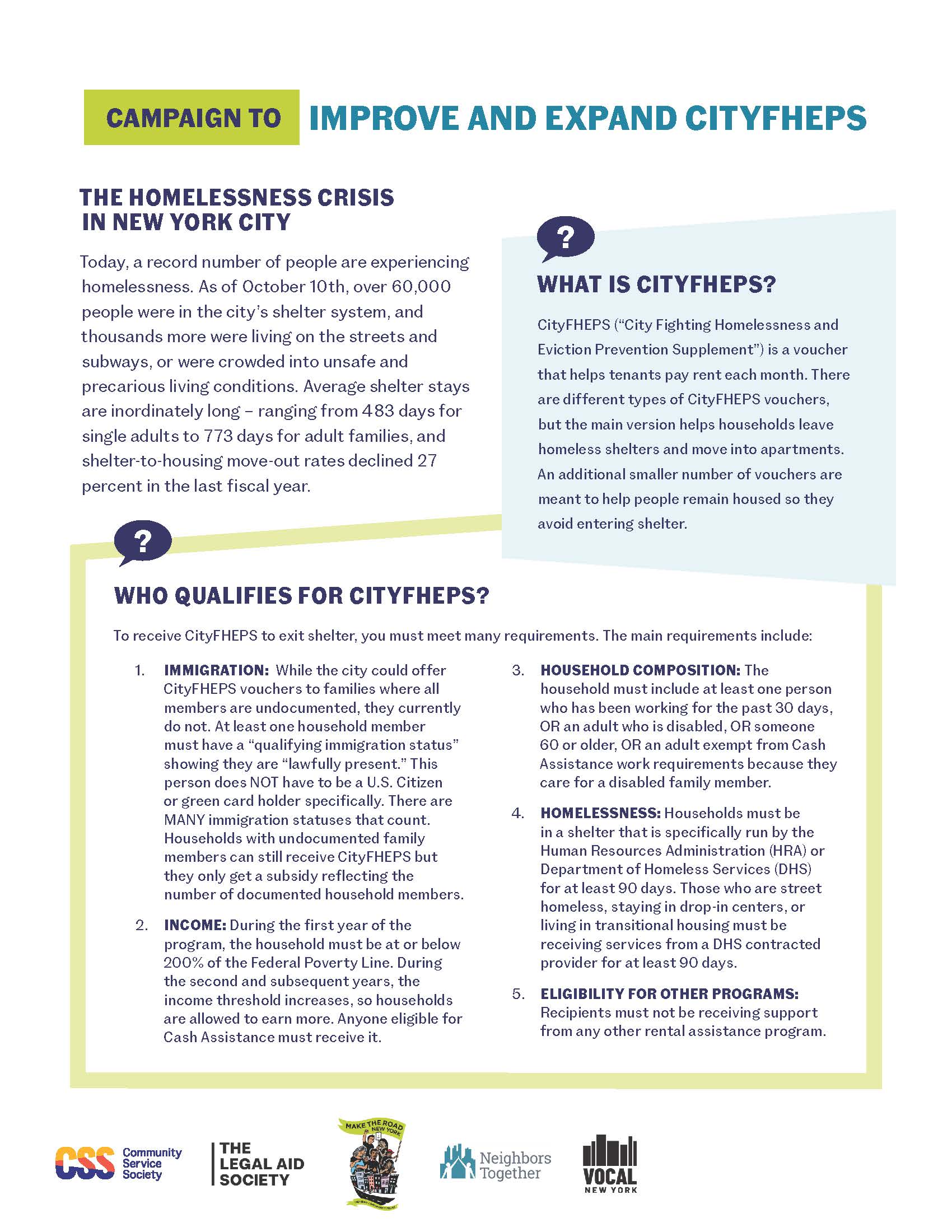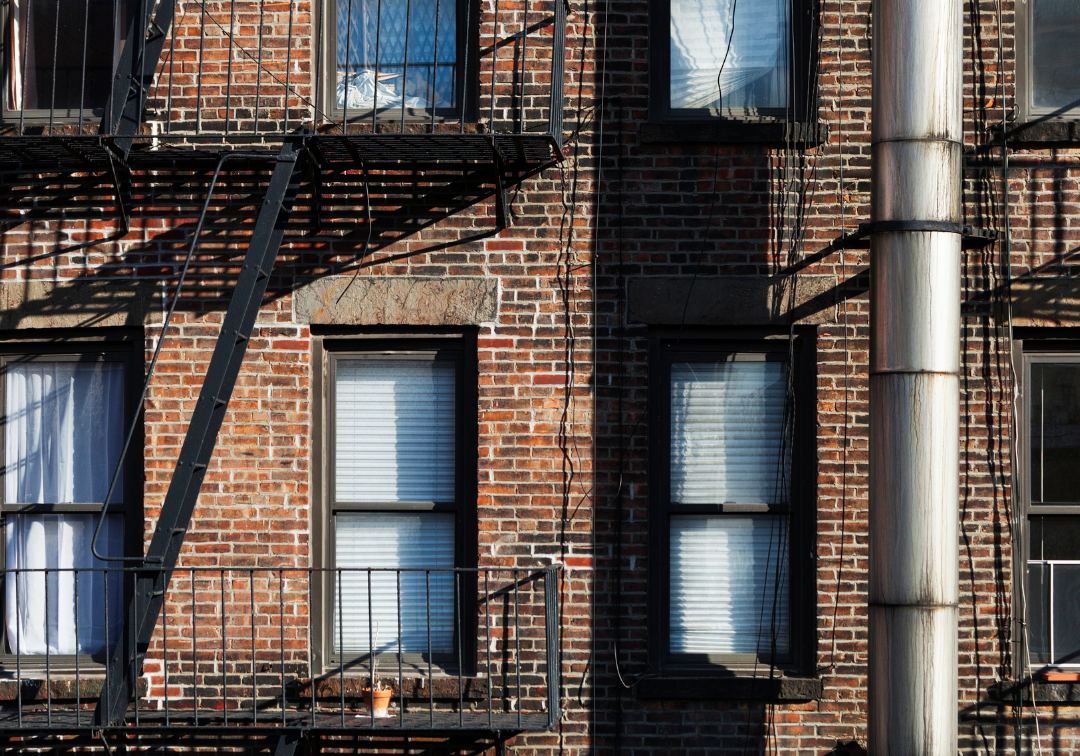
Improve and Expand CityFHEPS
Helping homeless New Yorkers find permanent homes
We applaud the NYC Council for taking action to avert a deeper homelessness crisis.
On May 25, 2023, the New York City Council took a step toward solving the city's homelessness crisis by passing Intros 878, 893, 894, and 229. However, Mayor Eric Adams then vetoed the package. These four bills will dramatically improve the CityFHEPS program, and we urge the NYC Council to override the mayor's veto.
With these changes, CityFHEPS will allow more people to move from shelter to safe and affordable housing quicker, while keeping others housed permanently.
We commend the leadership of Speaker Adams, Deputy Speaker Ayala, and Housing Chair Sanchez, who recognize the urgency of the moment, especially as deadlock in Albany continues. We also thank the Legal Aid Society, VOCAL-NY, Neighbors Together, and Make the Road NY for working with CSS to support these important reforms, and for their steadfast dedication to making the city more hospitable to all New Yorkers.
Read more about the issue below.
The Homelessness Crisis in New York City
Today, a record number of people are experiencing homelessness. Thousands are in the city’s shelter system, and thousands more were living on the streets and subways, or were crowded into unsafe and precarious living conditions. Average shelter stays are inordinately long – ranging from 483 days for single adults to 773 days for adult families, and shelter-to-housing move-out rates declined 27 percent in the last fiscal year.
What is CityFHEPS?
CityFHEPS (“City Fighting Homelessness and Eviction Prevention Supplement”) is a voucher that helps tenants pay rent each month. There are different types of CityFHEPS vouchers, but the main version helps households leave homeless shelters and move into apartments. An additional smaller number of vouchers are meant to help people remain housed so they avoid entering shelter.
Who qualifies for CityFHEPS?
To receive CityFHEPS to exit shelter, you must meet many requirements. The main requirements include:
1. Immigration. While the city could offer CityFHEPS vouchers to families where all members are undocumented, they currently do not. At least one household member must have a “qualifying immigration status” showing they are “lawfully present.” This person does NOT have to be a U.S. Citizen or green card holder specifically. There are MANY immigration statuses that count. Households with undocumented family members can still receive CityFHEPS but they only get a subsidy reflecting the number of documented household members.
2. Income. During the first year of the program, the household must be at or below 200% of the Federal Poverty Line. During the second and subsequent years, the income threshold increases, so households are allowed to earn more. Anyone eligible for Cash Assistance must receive it.
3. Household Composition. The household must include at least one person who has been working for the past 30 days, OR an adult who is disabled, OR someone 60 or older, OR an adult exempt from Cash Assistance work requirements because they care for a disabled family member.
4. Homelessness. Households must be in a shelter that is specifically run by the Human Resources Administration (HRA) or Department of Homeless Services (DHS) for at least 90 days. Those who are street homeless, staying in drop-in centers, or living in transitional housing must be receiving services from a DHS contracted provider for at least 90 days.
5. Eligibility for other programs. Recipients must not be receiving support from any other rental assistance program.
Problems with CityFHEPS
While CityFHEPS helps people obtain stable housing, the program is plagued with issues, including:
1. Eligibility. Many households need CityFHEPS vouchers, yet strict rules limit who qualifies.
2. Delays. Unfortunately, it often takes months for someone with a CityFHEPS voucher to secure and move into an apartment. Typos, missing documents, and other minor mistakes cause entire applications to be denied or delayed, which forces some households to stay in shelter for longer than they have to.
3. Unfair rules. Unnecessary rules make it difficult for voucher holders to secure apartments. Under one rule, the city deducts a “utility allowance” from allowable rents, reducing the maximum rent a voucher holder’s apartment can charge, and limiting the apartments they can choose from. Another rule allows the city to reject apartments where the rent is deemed “unreasonable” in comparison to other rents in the immediate neighborhood. This comparison is late in the process, is not a legal requirement, and makes it extremely difficult for households to find apartments, particularly in a tight rental market.
4. Discrimination. Many landlords do not want to accept vouchers, and therefore refuse to rent apartments to CityFHEPS households. This is called source of income (SOI) discrimination, which is illegal. Unfortunately, the City administration is failing to combat this problem. The NYC Human Rights Commission’s (CCHR) Source of Income Unit is supposed to represent voucher holders experiencing discrimination, but it currently has just four employees and cannot protect peoples’ rights.
5. Poor apartment conditions. The limited pool of apartments available to and accepting of voucher holders are often in decrepit conditions. Landlords tend to do less upkeep and care for buildings where a majority of tenants have vouchers. This results in CityFHEPS households having to settle for substandard housing, particularly because there is nowhere they can go to complain, and because it is difficult to move out and find other apartments.
Prospective Solutions
Some steps the City can take to improve CityFHEPS include:
1. Expand eligibility to more households, such as to families where everyone is undocumented.
2. Reform bureaucratic processes to make sure that the City and shelter staff quickly process applications and that minor errors no longer result in month-long delays or outright denials.
3. Eliminate uneccessary rules, such as the 90-day shelter stay requirement, the utility allowance, and rent reasonableness rules.
4. Combat discrimination by rebuilding the City’s source of income discrimination unit and making sure that it has the capacity to actually enforce the rights of CityFHEPS households.
5. Improve code enforcement by ensuring that oversight agencies regularly conduct thorough inspections, and that they have the capacity and expertise needed to enforce necessary repairs.
Where can I learn more about CityFHEPS?
More information about CityFHEPS is available here. If you are in shelter and want to learn whether you qualify for CityFHEPS, you can speak with a representative from your shelter.
To Fight Homelessness, House the Pepole
Part 1: Reforming the CityFHEPS Voucher Program Is the Need of The Hour
At this moment of unprecedented need to keep people housed, the state government has, for all practical purposes, turned its back on renters by failing to create the Housing Access Voucher Program (Section 8 for New York State), pass Good Cause eviction protections, or expand Right to Counsel.
It falls on the city to recognize the urgency of the moment and address the housing and homelessness crisis. City Family Homelessness and Eviction Prevention Supplement (CityFHEPS) vouchers are a powerful tool that the city has an opportunity to strengthen by passing four bills.
Part 2: A deeper dive into the costs, benefits and savings of CityFHEPS reform and expansion
Our team dove into the nitty gritty details of CityFHEPS expansion and reform to dispel some myths that opponents have used in their pushback. The main critiques of the bill package are that the cost will be too high and it will make accessing housing more difficult for current voucher holders.
Our research shows that program expansion costs will be offset by savings from reduced shelter costs, resulting from shortened shelter stays and prevented evictions. There will also be long-term savings from keeping people housed in less expensive apartments than market units they may move into after spending months or years in shelter. By expanding housing access and keeping tens of thousands of people in their homes, the CityFHEPS reform and expansion package marks a significant step toward addressing the city’s housing and homelessness crisis.
News Clips
Understanding the City Fighting Homelessness & Eviction Prevention Supplement (CityFHEPS) Program: Budget, Usage, Expansion Projections, and Concerns by New York City Independent Budget Office (IBO)
I On Politics, by John A. Toscano and Annette Hanze Alberts, Queens Gazette
Mayor Adams, City Council at odds over homelessness issue in NYC, by Rob Taub, News 12 Brooklyn
On Politics: City Council's voucher plan could stanch the homelessness crisis, by Ross Barkan, Crain's New York
NYC Council overrides Adams' veto of housing voucher expansion bills, by Curtis Brodner, 1010 Wins
Council overrides mayor's housing-bill veto, escalating conflict, by Nick Garber, Crain's New York
NYC Council is preparing to quash Mayor Adams’ veto. But the fight could drag on for months, by Elizabeth Kim, Gothamist
Mayor Touts Progress on Housing Vouchers as Council Readies to Override His Veto, by Jeanmarie Evelly, City Limits
URBAN AGENDA: Expansion of CityFHEPs Voucher Program is a Moral Imperative, by David R. Jones, Amsterdam News
New bills would expand NYC housing vouchers, Manhattan Times
Mayor Adams’ small-potatoes housing moves, by Emerita Torres and Jose Lopez, New York Daily News
NYC should expand rental assistance program to include undocumented immigrants, advocates urge City Hall, by Chau Lam, Gothamist
Committee on General Welfare
Oversight - The CityFHEPS Rental Assistance Program
Testimony by: Jennifer Hinojosa
January 18, 2023
Thank you for this opportunity to comment on the issue of CityFHEPS rental assistance program. My name is Jennifer Hinojosa and I am a policy analyst at the Community Service Society. The Community Service Society is a 180-year-old independent nonprofit organization that addresses some of the urgent problems facing low-income New Yorkers and their communities, including citywide rising housing insecurity and homelessness.
Today, a record number of people are experiencing homelessness. According to the Department of Homeless Services, one year ago about 47,200 individuals were in a shelter.[1] Last week, about 70,500 people are in the city’s shelter system—an increase of 23,000 from this time last year. This is a 50% increase in a one-year span.
In addition, thousands more were living on the streets and subways or crowded into unsafe and precarious living conditions. Average shelter stays are incredibly long- ranging from 483 days for single adults to 773 days for families. Shelter to housing move out rates—appallingly low to begin with-- declined by 27 percent in the last fiscal year as the crisis deepened.
Given this background, we applaud the City Council and the Committee on General Welfare for convening this hearing on rental assistance in general and CityFHEPS in particular. While CityFHEPS can be a powerful tool against homelessness, the program is plagued with issues, including:
- Eligibility. Many households need CityFHEPS vouchers, yet strict rules limit who qualifies. To qualify for CityFHEPS, families have to navigate a maze of harsh and often contradictory requirements. Even for those who meet the complex criteria, the program is plagued by excessive delays. For example, advocates have long called to end the arbitrary “90-day rule” which requires most assistance seekers to spend a minimum of three months in a shelter before they become eligible. This rule takes a toll on families with young children whose lives are disrupted from repeated moves.
Our recommendation is to expand eligibility to more households, such as to families where everyone is undocumented. We appreciate the initiative, but we need more than just a resolution. It’s not enough.
The income and work requirement bill (or the intro bill T2023-2863 ) is a good first step but it is not comprehensive because other factors play a role - such as how long someone needs to stay in a shelter, immigration status, etc. So, we need something more holistic.
- Delays. Unfortunately, it often takes months for someone with a CityFHEPS voucher to secure and move into an apartment. Typos, missing documents, and other minor mistakes cause entire applications to be denied or delayed, which forces some households to stay in shelter for longer than they have to.
Our recommendation is to reform bureaucratic processes to make sure that the City and shelter staff quickly process applications and that minor errors no longer result in month-long delays or outright denials.
- Unfair rules. Unnecessary rules make it difficult for voucher holders to secure apartments. Under one rule, the city deducts a “utility allowance” from allowable rents, reducing the maximum rent a voucher holder’s apartment can charge, and limiting the apartments they can choose from. Another rule allows the city to reject apartments where the rent is deemed “unreasonable” in comparison to other rents in the immediate neighborhood. This comparison is late in the process, is not a legal requirement, and makes it extremely difficult for households to find apartments, particularly in a tight rental market.
Our recommendations is to eliminate the utility allowance and ease rent reasonableness rules.
- Discrimination. Many landlords do not want to accept vouchers, and therefore refuse to rent apartments to CityFHEPS households. This is called source of income (SOI) discrimination, which is illegal. Unfortunately, the City administration is failing to combat this problem. The NYC Human Rights Commission’s (CCHR) Source of Income Unit is supposed to represent voucher holders experiencing discrimination, but it currently has just four employees and grossly understaffed to protect peoples’ rights.
Our recommendation is to combat discrimination by rebuilding the City’s source of income discrimination unit and making sure that it has the capacity to enforce the rights of CityFHEPS voucher holders.
- Poor apartment conditions. The limited pool of apartments available to and accepting of voucher holders are often in decrepit conditions. Landlords tend to do less upkeep and outright neglect buildings where a majority of tenants have vouchers. This results in CityFHEPS households having to settle for substandard housing, particularly because there is nowhere, they can go to complain, and because it is difficult to move out and find other apartments.
Our recommendation to improve code enforcement by ensuring that oversight agencies regularly conduct thorough inspections, and that they have the capacity and expertise needed to enforce necessary repairs.
The Community Service Society of New York urges you to make the above changes to the CityFHEPs program as the number of homelessness individuals, families, and children are growing at alarming rates.
1. Source: NYC Shelter Count : City Limits
In a series of short briefs, we are exploring the various ways that the CityFHEPS program can be improved.
Fact Sheet 2: Eliminate Utility Cost Deductions
Our second piece in this series considers the question of deducting utility costs from rent. We recomend that, in instances where the landlord does not provide utilities, the cost of utilities should be made available by the city to the voucher holder to assist them with payment of utility cost.
Fact Sheet 1: Streamline and Expand Eligibility
This piece, the first in the series of recommendations, enumerates ways for New York City to make the application process easier while expanding eligibility.
FAQ: Application Process
While a record number of people are experiencing homelessness, well-funded rental assistance programs can act as a key mechanism for helping homeless New Yorkers leave the shelter system and find permanent homes. CityFHEPS is a voucher program that helps tenants pay rent each month, helping households leave shelters and move into apartments.
This FAQ explains who qualifies for CityFHEPS, the current problems with the program, and several potential solutions.

